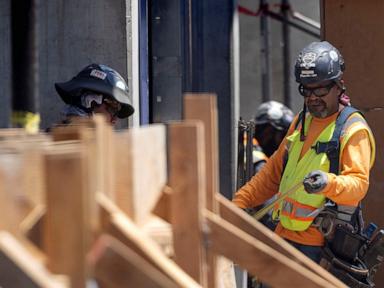LIST: These are the fastest-growing cities in the US, 2024 report finds

(NEXSTAR) — Does it feel like your city has gotten bigger in the last few years, or that more out-of-towners have moved in? Depending on where you live, that might be the case.
Personal finance website SmartAsset recently analyzed data from the U.S. Census Bureau to find the fastest-growing cities in the nation. Of the more than 600 cities analyzed based on one- and five-year changes in population, the report found five cities saw their population increase by more than 10% between 2022 and 2023.
Those cities were limited to two states, Maryland and Texas. Of those, only one saw a five-year population increase below 20%: Silver Spring, Maryland.
Located just north of the District of Columbia, Silver Spring's population rose by 12.86% to nearly 85,000 people — the largest one-year growth rate of any of the cities analyzed. Over the previous five years, however, it saw only a modest growth of less than 4%.
During that extended time period, SmartAsset found that Buckeye, Arizona, saw the largest population increase at more than 46%. While large, that's smaller than the growth it reported between 2017 and 2022.
The table below shows the five cities that grew the fastest over the one- and five-year frames analyzed by SmartAsset:
| Cities with the largest one-year population increases | Cities with the largest five-year population increases |
|---|---|
| 1. Silver Spring, Maryland (12.86%) | 1. Buckeye, Arizona (46.41%) |
| 2. New Braunfels, Texas (12.49%) | 2. Atascocita, Texas (38.56%) |
| 3. Glen Burnie, Maryland (11.82%) | 3. Lehi, Utah (36.65%) |
| 4. Georgetown, Texas (11.34%) | 4. Goodyear, Arizona (34.97%) |
| 5. Atascocita, Texas (11.03%) | 5. Riverview, Florida (33.04%) |
Arizona, Florida and Texas — all warm-weather states — had the most cities among the 15 fastest-growing cities over the one- and five-year periods.
You can view SmartAsset's list in the interactive table below:
Which cities are seeing population declines?
Not all cities were lucky enough to see their populations increase. Over 260 cities experienced the opposite between 2022 and 2023, with declines ranging from 0.01% decreases to more than 10%. The hardest hit was Spring Valley, Nevada, where the population dropped 10.14% over one year.
When ranked based on population decreases over the last five years, Spring Valley's neighbor, Paradise, landed at the top of the list. According to SmartAsset, Paradise — covering the area around Harry Reid International Airport — saw its population drop by nearly 27% between 2018 and 2023.
The table below shows the cities with the largest population declines over the one- and five-year periods.
| Cities with largest drop in population over one year | Cities with largest drop in population over five years |
|---|---|
| 1. Spring Valley, Nevada (-10.14%) | 1. Paradise, Nevada (-26.77%) |
| 2. Town 'n' Country, Florida (-9.77%) | 2. Flint, Michigan (-16.97%) |
| 3. Kendall, Florida (-9.32%) | 3. Arden-Arcade, California (-15.72%) |
| 4. Carmichael, California (-7.82%) | 4. Bloomington, Indiana (-14.44%) |
| 5. Brandon, Florida (-7.8%) | 5. Miami Beach, Florida (-13.19%) |
Ranked by five-year population declines, California had among the most cities — six, in Arden-Arcade, Union City, El Monte, East Los Angeles, Pleasanton, and Baldwin Park — on the bottom end of SmartAsset's list.
Florida and Indiana tied for the number of cities seeing the sharpest population declines over a one-year period at four apiece. In Florida, it was Town 'n' Country, Kendall, Brandon, and Lehigh Acres, while in Indiana, it was Lafayette, South Bend, Evansville, and Bloomington.
What about the country's largest cities?
Of the five largest cities in the U.S., only two saw population increases over the last year: Houston and Phoenix, at 0.31% and 0.34%, respectively. Between 2022 and 2023, New York City saw its population decline by 0.93%, a much larger percentage than Los Angeles (-0.03%) and Chicago (-0.02%).
Over the five-year period SmartAsset analyzed, all five cities saw their populations drop. Los Angeles had the biggest population drop at -4.25%. In New York and Chicago, the decline was above 1%, while Houston and Phoenix were below 1%.
While the data does not show why these populations declined, three of the years included in the time period were during the COVID pandemic when some Americans — then able to work remotely — opted to move out of large metro areas.
Other large U.S. cities saw their populations climb during the same years. Seeing the largest increases were Jacksonville, Florida (9.07%) and Fort Worth, Texas (8.68%).
Despite those growths, Florida and Texas saw thousands of people move out in 2023, recently released Census data shows.
Topics
-

Gen Z is thriving financially in these US cities, new report says
Politics - The Hill - October 26 -

Trump promise to repeal Biden climate policies could cost US billions, report finds
World - The Guardian - November 14 -
The ancient UNESCO-listed city that’s considered the cradle of Thai culture
World - Yahoo News - November 14 -

Trump health secretary choice is ‘courting catastrophe’, says rights group – as it happened
World - The Guardian - 6 days ago -

Church covered up 'abhorrent' abuse, report finds
Top stories - BBC News - November 7 -

US election 2024 live: Donald Trump says ‘we made history’ as he closes in on victory with win in Pennsylvania
World - The Guardian - November 6 -

Jobs report offers blurry snapshot of economy days before election: What to know
Top stories - ABC News - November 1 -

Bullying and harassment claims rise across City, regulator finds
Business - Financial Times - October 24 -

PhD student finds lost city in Mexico jungle by accident
Top stories - BBC News - October 29
More from The Hill
-

The Ukraine war Trump could inherit after Biden’s escalation
Politics - The Hill - 33 minutes ago -

Bill Clinton: Trump has done 'everything he could' to 'destroy' confidence in government
Politics - The Hill - 41 minutes ago -

Senate Democrat: Trump wants to 'subjugate' GOP senators with Gaetz appointment
Politics - The Hill - 41 minutes ago -

More Republican women buying guns: Gallup
Politics - The Hill - 41 minutes ago -

Man convicted of plotting to kill agents investigating his role on Jan. 6
Politics - The Hill - 44 minutes ago
